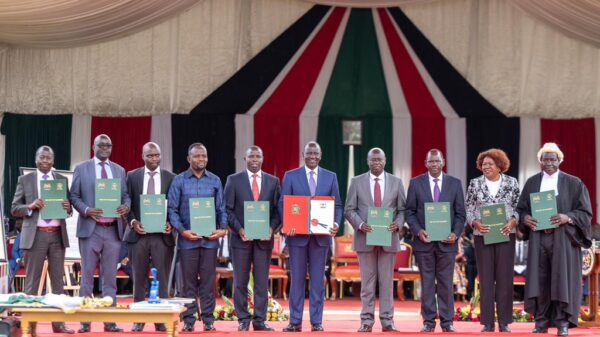
The manual targets investigators, administrators, prosecutors and judicial officers; it will also be of benefit to business persons, students, academics and teachers who seek to learn more about the vice.
NAIROBI, Kenya, Nov 7 – A manual to combat illicit trade which is negatively impacting the Kenyan economy has been launched by the Kenya Magistrates and Judges Association (KMJA) in conjunction with the Kenya Association of Manufacturers (KAM).
During the judicial officers’ association annual meeting, Chief Justice Willy Mutunga cited the dangers of illicit trade further hinting at the possibility of the formation of a High Court’s division to deal with cases involving tax evasion and counterfeit trade.
“Illicit trade is very harmful to our economy. Indeed, it is a threat to our democracy as well because it tends to finance retrogressive candidates in our elections and compromise our institutions of governance and accountability–counterfeit goods such as medicine compromise our health,” said Mutunga.
The manual launched by the judges and magistrates serves as a source of information for different parties and institutions on illicit trade, while at the same time simplifying laws that are applicable to the vice and also describing the procedures surrounding the prosecution of illicit trade and the fight against it.
The manual targets investigators, administrators, prosecutors and judicial officers; it will also be of benefit to business persons, students, academics and teachers who seek to learn more about the vice.
Speakers present noted the importance of the judicial system in dispensing justice, while at the same time balancing the interests of various stakeholders in a quick, efficient and effective manner in order to sustain economic growth.
“Delays in the judicial process costs the economy heavily—delayed justice is very expensive it leads to greater costs of litigation, this fictitious litigants are known, and I think the courts should find a way of really handling them because if you look at Kenya today, a lot of things are not moving forward jst because of people who are used to litigation,” said Kenya National Chamber of Commerce and Industry Chairman Kiprono Kittony.
Kittony further urged the judicial officers to come up with a case-time management system which would ensure business owners do not take time while waiting for the mention of their cases.
He added that this would reduce cases of corruption where business people in the rush to have their cases heard may be forced to compromise some of the judicial officers.
On her part, Kenya Association of Manufacturers CEO, Betty Maina said business needed to have confidence in the legal system as no confidence would affect the company’s bid to innovate due to uncertain liabilities.
“A well functioning court system is crucial for economic growth–well designed laws and regulations cannot on their own ensure business rights without an institution that will through dependable interpretation enforce this rights and settle disputes,” said Maina.
The Chief Justice reiterated Maina’s statement saying that he understood that businesses thrived in environments that upheld the rule of law and expeditiously adjudicated disputes.
“For a long time, banks and other financial institutions have been concerned over the manner in which courts have granted injunctive orders that affect their businesses. There are now stricter and firmer conditions to be met before the grant of injunctions,” Mutunga added.
“It is important that while remaining true to our oaths to be fair to all, we take care not to turn courts into a haven for tax fugitives or a refuge for the corrupt,” Mutunga retorted.
Mutunga further commended the Judges and Magistrates for their efforts in reducing the backlog of cases that had marred the courts adding that Judiciary was in the process of recruiting more Judicial officers to ensure the remaining cases are expedited.
“We have made great strides in clearing the case backlog, reducing the numbers from an estimated one million cases three years ago to 400,000–the Judicial Service Commission has recruited an unprecedented number of judges, magistrates and Kadhis – but we are still a long way from attaining our optimal establishment level,” Mutunga stated.


































